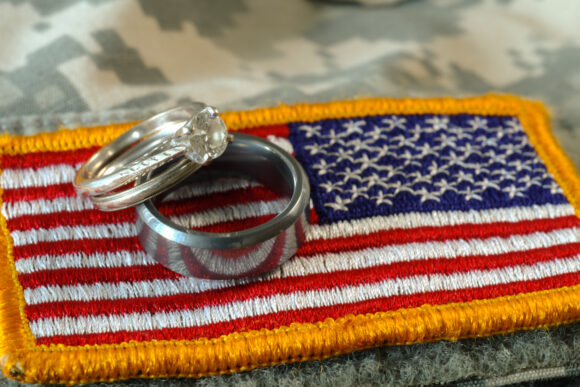The VA loan is a specialized mortgage program for veterans and active duty servicemembers. This unique loan offers numerous advantages, such as:
- No down payment requirement
- Lower interest rates
- More lenient credit standards than traditional loans
- No private mortgage insurance (PMI)
There are several ways that civilian spouses can be involved in or even obtain a VA loan on their own:
- As a co-borrower or co-signer with the veteran borrower
- As a non-purchaser on the loan with the veteran borrower
- Surviving spouses can obtain a VA loan on their own under certain circumstances
Read on to learn everything you need to know about spouses and VA loans.
Key Points
- Spouses can be co-borrowers on a VA loan. They must meet the same financial requirements as the primary borrower.
- Adding a co-borrower is not required but can have several advantages.
- Surviving spouses can get a VA loan on their own under certain circumstances.
- Ex-spouses do not qualify for VA loans. If a spouse is a co-borrower and is currently going through a divorce, the next steps and outcome will likely be unique to their legal situation.
Co-borrowing with a Military Spouse
Veterans can apply for the VA loan on their own or with their spouse as a co-borrower. While not required by the VA, adding a co-borrower can have several advantages, including:
- Financial liability and shared responsibility: A co-borrower agrees to be financially liable for the loan should the primary borrower default. The veteran and their spouse will be equally responsible for the monthly payments, which are included on the title, and share the equity in the home.
- Combined incomes: Adding your spouse as a co-borrower combines both incomes, which can help you qualify for a larger loan amount. A higher combined income can improve your debt-to-income ratio (DTI), enhancing your chances of loan approval.
If you apply for a VA loan with your spouse, both of you must meet your lender’s financial requirements. These conditions can vary but will likely include a review of your financials, such as your credit score, DTI, and income.
Most VA lenders typically require a credit score of at least 620. DTI ratio limits can vary by lender.
This means that if your spouse’s qualifications don’t meet your lender’s requirements (e.g. a credit score lower than 620), you may need to consider being the sole borrower. But, don’t worry: You can always refinance down the road if your spouse manages to improve their credit score. And, refinancing can come with several advantages, which you can read about in our guide to the pros and cons of refinancing a VA loan.
Can my spouse use a VA loan without me?
It’s important to understand that the VA loan is almost exclusively reserved for veterans and active-duty service members. The veteran must always be the primary borrower on a VA loan, except in cases involving surviving spouses.
Do I have to list my spouse on my loan?
No. Lenders don’t require borrowers to list their spouse on their loan.
However, in community property states, spouses’ debts and income may be considered during the loan approval process, even if you’re not co-borrowing.
Spouses as Co-Signers on a VA Loan
While it’s more common for spouses to be co-borrowers, they can also act as co-signers. A co-signer provides additional security by agreeing to take on the debt if the primary borrower defaults but does not have ownership interest in the property. Co-signers can help strengthen the loan application if the primary borrower has weaker credit or income, though lenders typically prefer spouses as co-borrowers. Both roles require meeting the lender’s credit and income requirements.
VA Loan Surviving Spouse Requirements
The VA can extend VA home loan benefits to widows and widowers of servicemembers who died while on active duty or from a service-connected disability.
Surviving spouses of eligible veterans can typically qualify for the VA home loan benefit if they remain unmarried and the veteran’s passing meets one of the criteria below:
- The veteran is a POW (prisoner of war) or MIA (missing in action)
- The veteran passed away during active duty service or from a service-related disability (and the spouse has not remarried)
- The veteran passed away during active duty service or from a service-related disability, and the spouse did not remarry before they turned 57 years old or prior to December 16, 2003
- The veteran was totally disabled and passed away, but their disability may not have been their cause of death (in specific situations)
In addition to meeting financial requirements, you must apply for a Certificate of Eligibility (COE) to obtain a VA loan as a surviving spouse. Your local VA office can help guide you on acquiring your COE.

Check your VA Home Loan eligibility and get personalized rates. Answer a few questions and we'll connect you with a trusted VA lender to answer any questions you have about the VA loan program.
Non-Purchasers on a VA Loan
Spouses can be listed on VA loans as “non-purchasers.” This allows spouses to have ownership over the house without having their financial information considered during the qualification process (except in community property states).
Veterans and their spouses may choose to do this so that the spouse’s financial information is not factored into the loan, but the spouse still gets ownership of the house.
Community Property States
Community property states consider any assets or debts acquired by either spouse during the marriage to be jointly owned. This means that both incomes and debts are legally shared, regardless of who incurred them.
So, when applying for a mortgage loan in a community property state, the non-purchasing spouse’s financial information is considered alongside the purchasing spouse’s. This can affect loan approval and the amount the couple qualifies for, as the lender evaluates both credit histories and debts.
The community property states in the United States are:
- Arizona
- California
- Idaho
- Louisiana
- Nevada
- New Mexico
- Texas
- Washington
- Wisconsin
Additionally, Alaska allows couples to opt into community property status, but it is not automatic.
Some community property states allow non-purchasing spouses to release their ownership interest and allow the borrower to close without counting their debts on the loan. Depending on where you purchase, these closing documents can be known as spousal waivers or quitclaim deeds.
Divorce and VA Loans
Ex-spouses of military members do not qualify for VA loans on their own. If you’re going through a divorce with a spouse with whom you co-borrowed the loan, your next steps will depend on how you choose to handle the marital property and the applicable laws in your state.
Couples who share a VA loan and are going through a divorce have several options, which we explain in our guide to divorce and VA loans. In summary, you can:
- Consider selling the home
- The ex-spouse can assume the VA loan
- You can refinance the VA loan under just your or your spouse’s name
The veteran’s entitlement will be tied to the loan. So, if the civilian spouse keeps the loan active, the servicemember’s entitlement will be impacted until the loan is either paid off or refinanced.
Consult a legal professional for further information.
VA Loan Spouse Requirements FAQs
Does my spouse have to be on my VA loan?
No. A co-borrower is not required to get a VA loan. Married servicemembers often apply with a spouse to qualify for a higher loan amount, but it is not required.
Will my spouse’s credit score affect my VA loan?
It depends on whether they co-borrow the loan with you and/or if you live in a community property state.
If you do not include your spouse as a co-borrower, their financial status will not affect your VA loan qualification unless you reside in a community property state.
If you include your spouse as a co-borrower on your VA loan or you live in a community property state, their credit score and debts can affect it. Lenders often consider the lowest credit score. So, there may be instances where it’s best to be the sole borrower on a VA loan.
Can two married veterans combine their VA loans?
Yes, two married veterans can combine their entitlement amounts to obtain a VA loan. Other options include splitting your entitlements or only using one spouse’s entitlement on a VA loan.
Married veterans can also combine leftover entitlement from a prior purchase with the full entitlement of their spouse.
In any scenario where a portion of both veterans’ entitlement is being used, both veterans must meet the VA lender’s financial eligibility and requirements. Additionally, the couple must intend to occupy the property as their primary residence.
More Reading
How to Apply For a VA Loan: An Overview
15-Year vs 30-Year VA Loan – Which is the Better Mortgage?
VA Loan Appraisal and Inspection Requirements




Comments:
About the comments on this site:
These responses are not provided or commissioned by the bank advertiser. Responses have not been reviewed, approved or otherwise endorsed by the bank advertiser. It is not the bank advertiser’s responsibility to ensure all posts and/or questions are answered.
Nelda Barnes says
I need assistance in getting approved for a VA loan. My late husband, Ret Brig Gen Jerome Rash Barnes Jr, passed away 8 yrs ago. I’m trying to get compensation due to his Agent Orange related issues. Prostate cancer, colon cancer, AFIB; he did not want to do chemo and radiation.
I have been trying to get monthly DIC compensation along with the lump sum payment due to his years of service at CamRanh Bay; Vietnam. He served for 30 yrs; he retired in 1981.
I keep running into “brick walls”. Can someone please help me? I am 72; I’ve had 2 spinal surgeries ( half my spine has a titanium cage with bolts and screws), and both hips replaced due to lifting and taking care of him.
My name is Nelda Barnes
Ryan Guina says
Hello Nelda, I’m sorry for your loss. I recommend working with a Veterans Service Organization. Many of them have trained benefits counselors who can help you file a claim. Here is more information about Veterans Service Organizations, along with some recommended organizations.
I wish you the best.